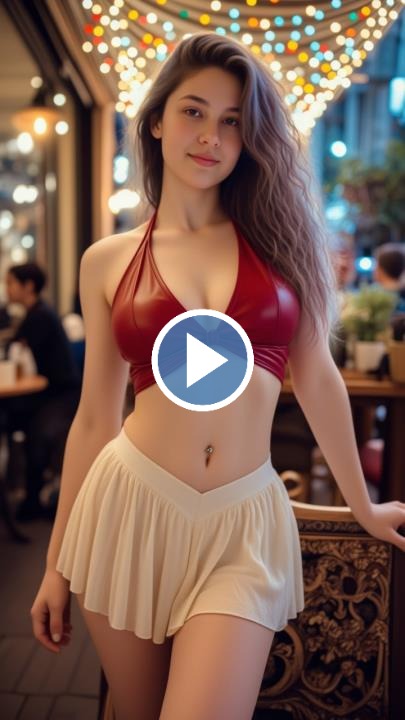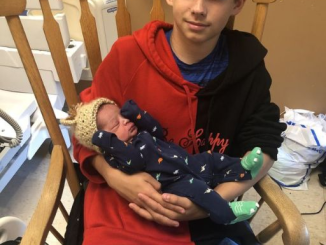
My shift had started before the sun rose, the city still cloaked in fog and silence. I’d already responded to two domestic calls, one attempted break-in, and a stranded motorist who thought I could also fix transmissions. I was tired. My shirt clung to me beneath the vest. I hadn’t eaten since 3 a.m., and the bitter gas station coffee was burning a hole through my stomach.
Then my phone buzzed.
“She forgot her lunch again,” my wife texted. “If you have a minute…”
I had a minute.
The studio wasn’t far from where I’d just finished a report. My daughter, Maia, was in her new ballet class—her first real one. She’d been talking about it nonstop for weeks. I figured I’d walk in, hand off the lunchbox to the front desk, and slip back out before anyone even noticed the guy in uniform.
But when I opened the door to the studio, I stopped dead in my tracks.
There she was. Tiny bun on her head. Maroon leotard. Little hands gripping the barre like it was the only thing holding her to the earth. She was so focused, tongue poking from the corner of her mouth, just like her mother when she concentrated.
She didn’t see me at first.
Then the instructor, a tall woman with steel-gray hair and eyes as sharp as needles, smiled and said, “Looks like we’ve got a new dancer.”
Every little head turned.
So did Maia.
And her whole face lit up like I’d hung the stars myself.
“Daddy!” she whispered, like the word was too sacred to say aloud.
The studio went quiet. Eyes fixed on me—badge, boots, the unmistakable clink of my duty belt. I was out of place, a bull in a ballet class. I half-raised the lunchbox like a peace offering.
Maia didn’t care.
She broke from the line and walked straight to me, her little slippers silent on the polished floor. She took my hand like she did when she was still learning to walk and tugged gently.
“Just one, Daddy. You missed the last one.”
I looked to the instructor. She nodded, without a word.
So I stepped into line.
The barre felt absurdly low, my movements clumsy and awkward next to these tiny, graceful creatures. I tried to mirror Maia’s foot placement. A plié, she called it. My knees cracked in protest. The other parents smiled from behind the glass. One mother pressed her hand to her heart. A father caught my eye and nodded.
And for a few minutes, I wasn’t Officer Reyes.
I wasn’t the man who kicked down doors or ran toward gunshots. I wasn’t the guy who slept in his patrol car more often than in his own bed. I was just her dad. The one who showed up. The one who mattered.
She leaned into me and whispered, “You’re getting better.”
Then my radio crackled.
Dispatch.
I didn’t even hear the first part, just the code: “10-33. Immediate assistance. Possible hostage situation. Corner of 4th and Lincoln.”
I stiffened. Maia looked up, sensing it.
“Is it bad?” she asked.
I crouched, touched her cheek. “I have to go. I’m sorry, honey.”
She nodded like a soldier. “Be safe, Daddy.”
I rushed out, adrenaline overtaking the warmth in my chest. The engine roared as I pulled onto the street. By the time I reached Lincoln, three units were already there. The building was an old liquor store turned payday loan shop—bars on the windows, peeling paint, a place you drove past without seeing.
A man inside had a clerk by the collar. Knife to her neck. He was yelling about injustice, lost jobs, something about his wife and pills. He was desperate. And desperation made people dangerous.
We coordinated quickly. I negotiated first, speaking through a bullhorn, trying to keep him talking. I asked about his wife. He answered. I asked about his name. He didn’t give it. My partner, Karesh, flanked the side window, giving me the signal.
Then—movement. The hostage twisted. A moment of hesitation.
That’s when I saw the man’s eyes. Wide, wild—but something else too. Regret.
I took the shot.
Not him—the knife.
It clattered to the floor as he dropped to his knees.
We cuffed him without a fight. The clerk was shaken but unharmed.
An hour later, I sat in the cruiser, the adrenaline fading. I pulled out my phone. A picture from my wife: Maia, holding the lunchbox like a trophy, beaming.
Another text beneath it: “She says you were the best one at pliés.”
I laughed out loud. The sound surprised me.
The next week, I dropped off lunch again.
This time, I brought sneakers.
Maia saw me through the window and waved me in like a VIP guest. I joined the class. I did pliés, jetés, and something called a tendu that felt like a pulled hamstring waiting to happen. The instructor didn’t even blink anymore. One of the moms offered me a granola bar during water break.
It became a thing.
Twice a month, on my days off, I went with Maia to ballet. No uniform. No badge. Just me.
That winter, something happened. A new girl joined the class. Her name was Samira, and she didn’t smile much. She watched from the back, arms tight around her middle. Her father came with her once—tattoos up to his neck, expression like stone.
The next time I saw her, she was alone.
I sat beside her after class. She didn’t talk at first. Then she said, “Your daughter’s lucky.”
I nodded. “Yeah. I’m lucky, too.”
She shrugged. “My dad used to come. But he says it’s not his thing.”
I didn’t know what to say. So I said, “You’re still here. That counts for something.”
Weeks passed.
Then one day, as I tied my laces, I saw him. Samira’s dad. Standing just inside the door, uncertain. I nodded to him, like that father had nodded to me, and after a beat, he walked in.
Samira lit up like Maia had.
We danced, all of us.
I still can’t touch my toes.
But I learned something in that studio.
Ballet isn’t about perfection. It’s about presence.
Being there.
Showing up, even when your boots squeak on the floor and your knees protest. Even when you feel out of place or out of breath. It’s about letting your guard down long enough to let someone in.
Maia’s getting better every week. She doesn’t need me at the barre anymore. But every time she glances back to check if I’m still watching, I nod.
I always nod.
Because I’m there.
Not as a cop. Not even as a dancer.
But as her dad.
And maybe that’s enough.
If this story moved you, share it. Maybe there’s someone out there who just needs a little reminder that showing up is the bravest thing you can do.






Leave a Reply